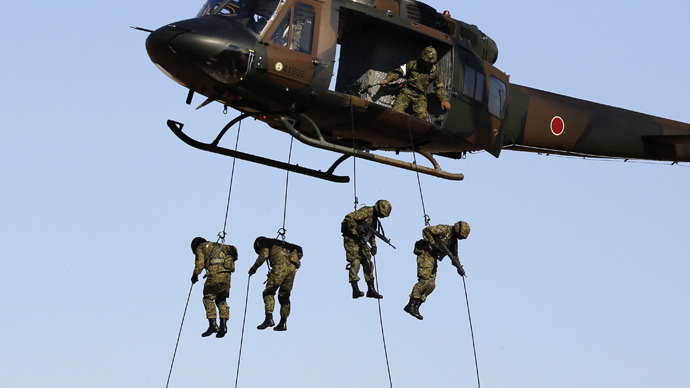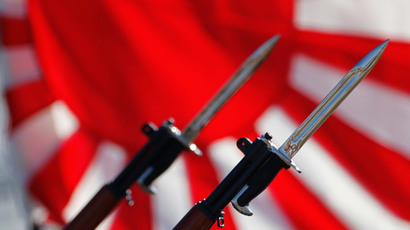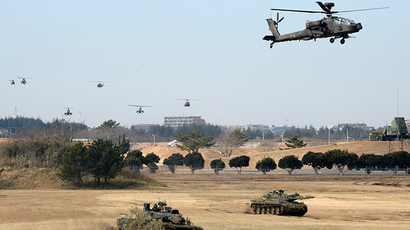Japan set to loosen control over military introduced post WWII – report

Japan wants to revise the existing law prioritizing civilian control over national self-defense forces, Japanese media reports. The idea of civilian participation in military decision-making was fostered following the defeat in WWII.
This proposal, to amend current provisions and give more direct power to the Joint Staff Act, will require legislative change, the sources close to the Defense ministry told The Japan Times. The draft law is likely to be submitted to the National Diet as soon as the next week.
The initiative of the further erosion the post-WWII legislature in Japan allegedly comes from SDF personnel, both acting and former officers currently occupying lawmaking positions in the Diet.
Japan’s ruling Liberal-Democrat Party (LDP) has also proposed to adopt a permanent law outlining use of weapons by SDF personnel while on foreign missions. Currently, every time the SDF goes on an overseas mission, an ad hoc law has to be adopted.
これも行政が立法(・ω・) RT @Thoton: #Japan to abolish civilian control of military, Japanese media say 防衛http://t.co/w6wuk9Gkulpic.twitter.com/d1hPxLNIj7
— OKAMOTO (@corochin61) February 21, 2015
Vice President of the LDP, Masahiko Komura, believes this legislation will establish a framework preventing excessive use of force by SDF troops during operations abroad, the Japan Times wrote.
Komura who heads of the coalition’s Committee for National Security, called for a party conference in Fukuoka on Saturday to consider the position of LDP’s coalition partner Komeito on the issue.
Another innovation reportedly proposed by the LDP is revision of the wording of the existing law that allow the SDF to provide “logistic support” to the US armed forces only in case of “contingencies in areas surrounding Japan.”
Komura proposed to eliminate the geographic qualification, insisting that “Any misleading phrase should be dropped” from the law and the concept of “areas surrounding Japan” should be omitted from the law as well.
READ MORE: Japanese citizen sues govt. over military expansion attempts
The law enacted in 1954 has considerably limited soldiers’ scope abroad, as the lessons of 1930s-1940s are still fresh in the memory, when the country was dragged into conflict with China and the Pacific War that followed.
READ MORE: Japan approves relaxed arms export rules
The first call to change the law of civilians ruling the military came in 2009, when the system of senior civilian ministry officials directly aiding the defense minister was scrapped, thus partially returning self-reliance to the SDF.
After over half a century of exemplary peaceful policies, Japan’s conservative government of Prime Minister Shinzo Abe is moving away from the pacifist stance fixed in the country’s post-WWII constitution.
In 2014, Abe’s cabinet reversed a post-war constitutional ban on military operations abroad. Japan renounced war after the adoption of the 1947 constitution.
This so-called “reinterpretation” enables Japan to come to the aid of the US or other allies, even if Japan is not the target of the attack, in a provision allowing “collective self-defense.” Previously, Japan’s military could only act if the country was under direct threat.
READ MORE: Japan approves largest military budget since WWII
Last month, the Japanese government approved the country’s largest military budget in 70 years, in a display of force to its highly militarized neighbors. Prime Minister Shinzo Abe's cabinet gave the green light to an unprecedented nearly 5 trillion yen ($42 billion) defense budget, which comes into force in April.














